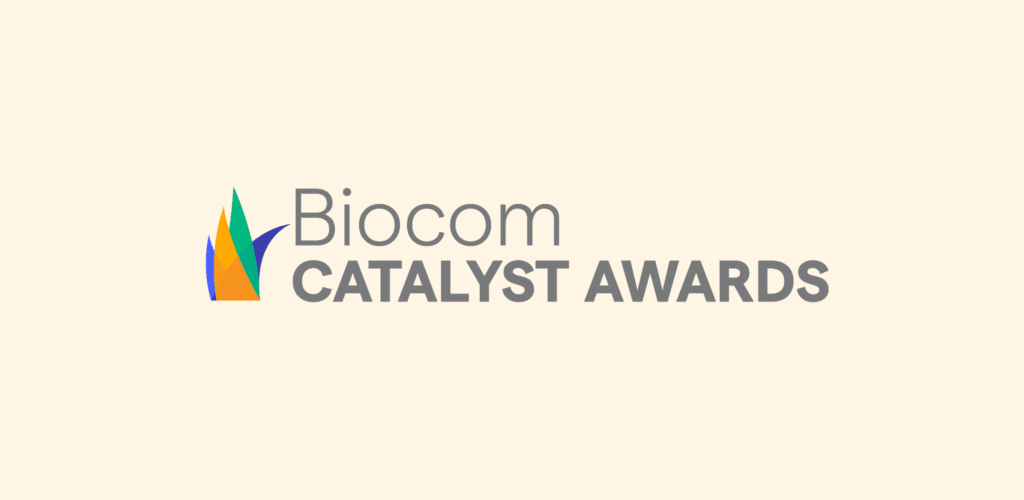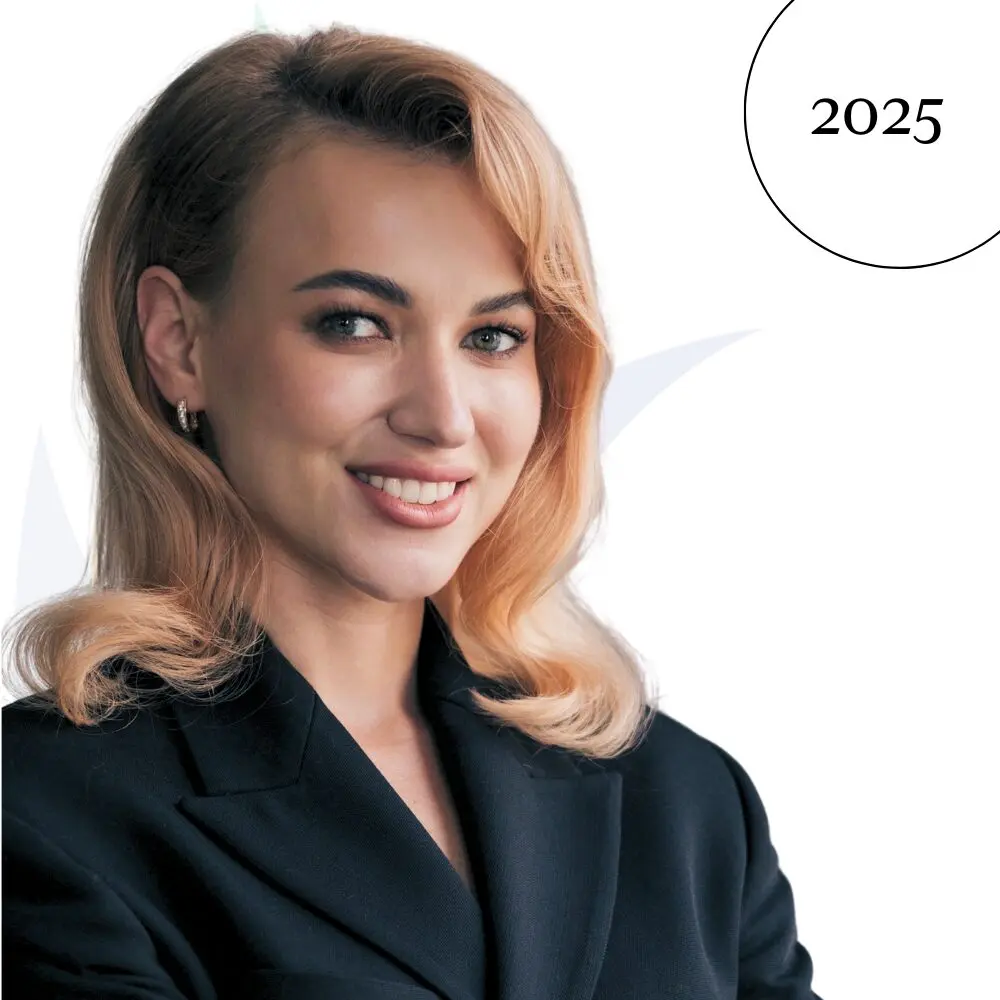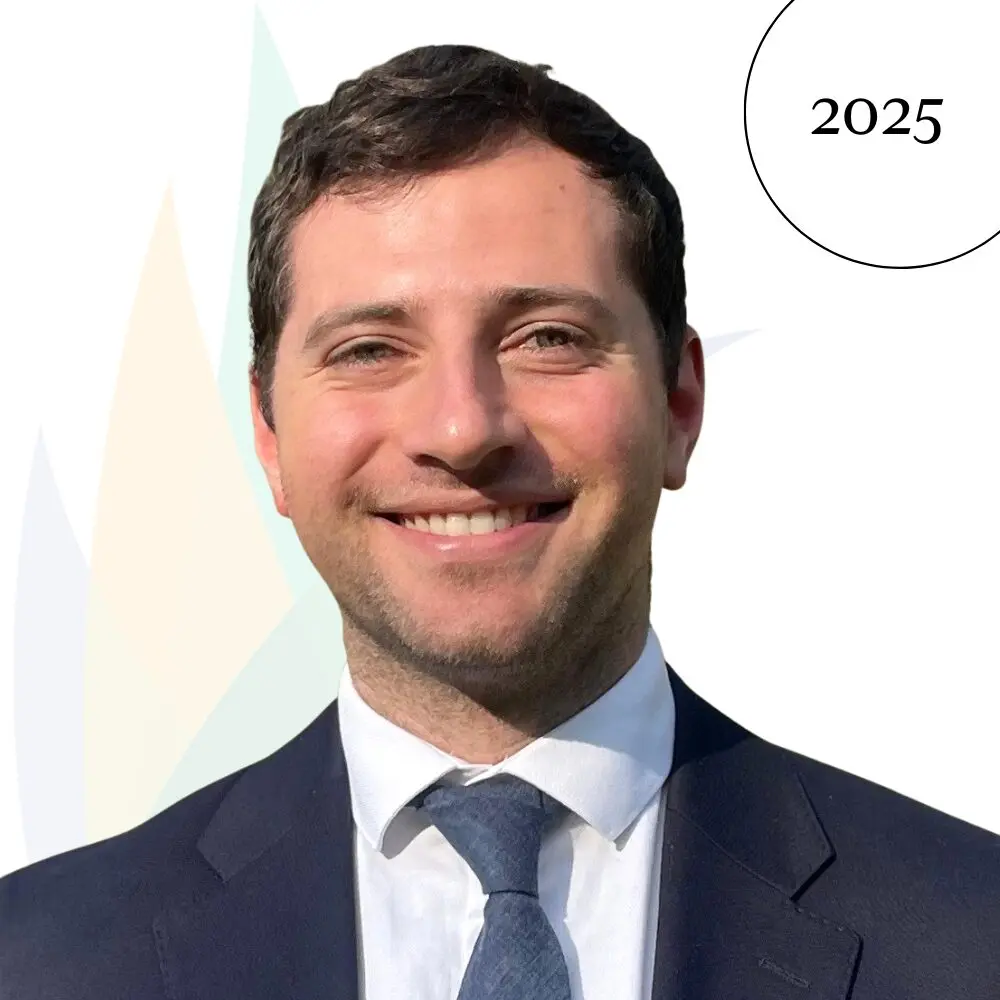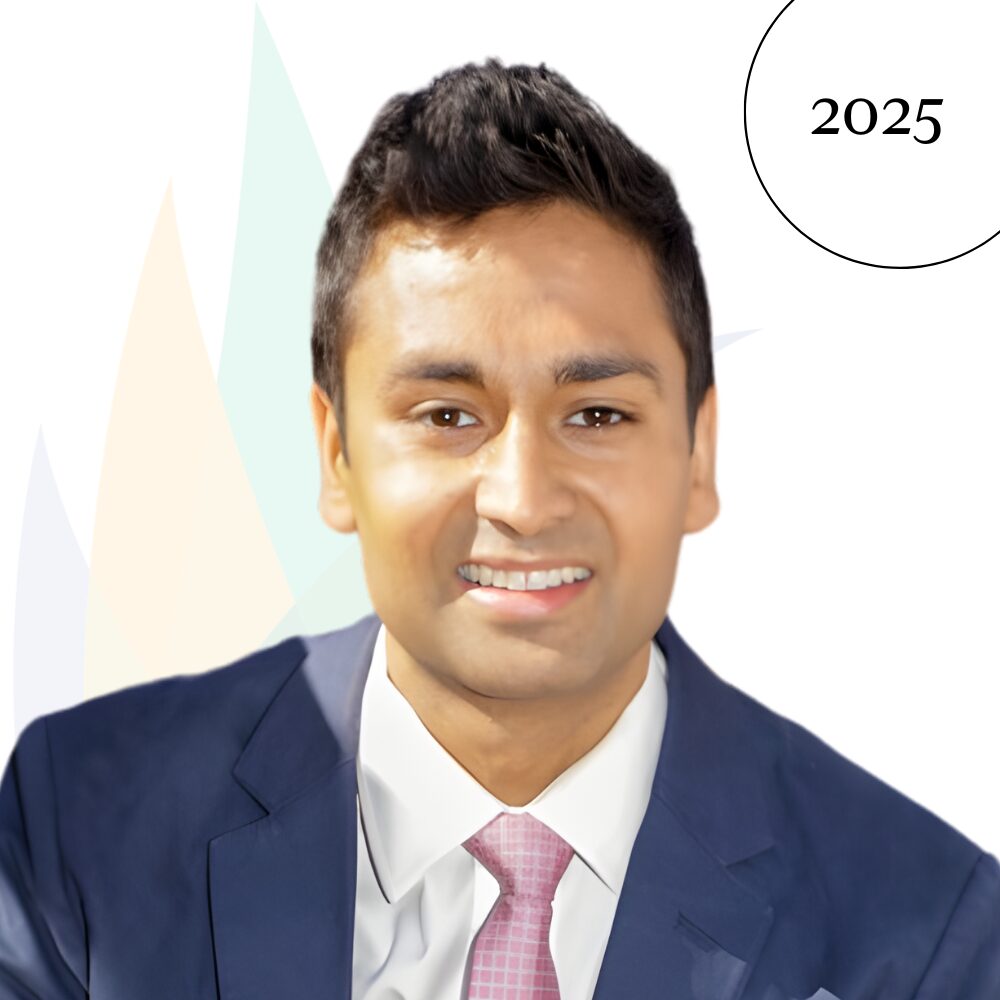
October 27, 2025
Meet Our 2025 Catalyst Awards Winners
Celebrating a Decade of Life Science Innovation and Leadership
This year marks the 10th anniversary of the Biocom California Catalyst Awards, honoring the next generation of life science leaders shaping the future in California and beyond. From pioneering therapies for rare diseases to applying artificial intelligence in drug development, the 2025 cohort exemplifies creativity, resilience and commitment to improving human health globally. Each recipient demonstrates the impact of collaboration, mentorship and innovative thinking, embodying the spirit of California’s vibrant life science ecosystem.
Empowering Scientists, Bridging Computation and Biology
Alina (Tokmakova) Arzamassky, Ph.D., co-founder and co-managing director, Nucleate Bay Area; product manager and business development, Deep Origin
Alina Arzamassky is a scientist, entrepreneur and community builder completing her Ph.D. in Biophysics at UCSF, where she developed novel physics-based scoring functions to improve molecular docking for small-molecule drug discovery. She holds dual degrees in Theoretical Physics and Biophysics from the Moscow Institute of Physics and Technology.
Alina founded and leads Nucleate Bay Area, supporting over 30 startups while fostering collaboration among students, scientists and investors. “I’ve always believed the best breakthroughs happen when people with diverse skills and perspectives come together,” she says, emphasizing mentorship and community building.
After graduation, Alina will join Deep Origin as Product and Business Development Manager to advance next-generation software for in silico drug discovery, strengthening ties between computation and experimental biology. Her work reflects a dedication to translating scientific innovation into practical solutions that improve human health.

Closing the Gap Between Innovation and Access in Healthcare
Shreya Badhrinarayanan, M.D., global development lead, clinical development oncology and hematology, Pfizer
Shreya Badhrinarayanan guides oncology and hematology clinical development at Pfizer, connecting scientific innovation to patient outcomes worldwide. “The greatest divide is often not between discovery and possibility, but between innovation and access,” she says. “I aim to close that gap.”
Her work advances equitable trial design, including antibody drug conjugates, immune checkpoint inhibitors and next-generation targeted therapies, each developed to give patients “one more birthday with their family.” She mentors emerging leaders, contributes to ENCODA’s global health initiatives and shapes a future where scientific breakthroughs and equitable access go hand in hand.

Breaking New Ground in Male and Female Contraception
Akash Bakshi, co-founder and CEO, YourChoice Therapeutics
Akash Bakshi is co-founder and CEO of YourChoice Therapeutics, a pioneering biotech company developing non-hormonal contraceptives for both men and women. Recognized for his innovative approach, Akash is challenging long-standing gender norms in family planning and advocating for shared responsibility in contraception. Since founding the company in 2018, he has led efforts to create safe, effective and novel options, addressing a need that has been largely overlooked for decades.
Under Akash’s leadership, YourChoice Therapeutics became the first company to advance a non-hormonal male contraceptive into clinical trials, marking a historic step in contraception innovation. He emphasizes the importance of navigating ambiguity in biotech and building a culture that values diverse perspectives. Akash also highlights the role of mentorship and representation in empowering the next generation of life science leaders.
“Winning the Catalyst Award is a recognition of our hard work and a reminder of the impact we can have on health and wellbeing for future generations,” says Akash.

Unlocking the Secrets of Aging
Martin Borch Jensen, Ph.D., chief scientific officer, Gordian Biotechnology
Martin Borch Jensen is co-founder and CSO of Gordian Biotechnology, discovering novel therapeutic targets through in vivo screening. He also leads Norn Group, supporting longevity research through grantmaking and strategic development.
“The reasonable person adapts to their environment, and the unreasonable person tries to adapt their environment to them. All progress is made by unreasonable people,” he says, reflecting his approach to tackling aging and complex disease. Originally planning to become a lawyer, Martin pivoted to life sciences to confront age-related diseases and improve human health.

Redefining Breast Cancer Recovery
Lauren Cornell, Ph.D., co-founder and CEO, NovoThelium
Lauren Cornell, co-founder and CEO of NovoThelium, develops acellular nipple-areolar grafts to improve breast reconstruction outcomes. Inspired by her grandmother’s breast cancer experience, Lauren focuses on restoring identity and confidence for survivors.
“Our mission is to help women feel complete again,” she says. A translational scientist, she has guided NovoThelium from concept to preclinical success while mentoring women in STEM. Lauren also served as an analog astronaut for NASA’s HERA program, channeling curiosity to solve human challenges with compassion and precision.
Her work reflects an intersection of science, empathy and innovation, transforming patient experiences while advancing regenerative medicine.

Transforming Research Through Scalable Cell Technologies
Joe de Rutte, Ph.D., co-founder and CEO, Partillion Bioscience
Joe de Rutte is co-founder and CEO of Partillion Bioscience, leading development of microscale technologies that enable researchers to study millions of individual cells simultaneously. His work on “nanovials” allows unprecedented insights into antibody discovery and immune response.
“The tools that change science the most are the ones everyone can use,” Joe says. A first-generation college graduate, he mentors young scientists through programs like Bioscience LA, helping translate curiosity into meaningful impact.
His career reflects a commitment to accessibility, innovation and scalable solutions that accelerate biomedical research while inspiring the next generation of life science leaders.

Accelerating Neurological Drug Discovery
Maya Gosztyla, Ph.D., co-founder and chief scientific officer, BrainStorm Therapeutics
Maya Gosztyla, co-founder and CSO of BrainStorm Therapeutics, develops patient-derived brain organoid models and AI-driven platforms to accelerate neurological drug discovery. Her work spans Parkinson’s disease and rare disorders like CDKL5 deficiency.
“Patients paying things forward can shape the next generation of therapies,” Maya says. She mentors emerging scientists, publishes on anti-racism in STEM and communicates complex science to the public. Her research reflects the power of persistence, curiosity and human connection in advancing therapies for neurological diseases.

Lowering Barriers for Biotech Startups
Dipesh Lad, CEO, LifeSpace Labs
Dipesh Lad founded Lifespace Labs to provide affordable lab space and community for early-stage biotech companies. Drawing from his engineering background, Dipesh recognized the high cost of lab space as a barrier to innovation and designed Lifespace Labs to enable startups across therapeutics and diagnostics.
“Life science isn’t always shown to everyone. You don’t need a Ph.D. to make an impact—you just need curiosity and the willingness to learn,” he says. Beyond his company, Dipesh mentors emerging scientists and advocates for outreach across California’s Central Valley.
Through Lifespace Labs, he fosters collaboration, lowers entry barriers and empowers innovators to translate ideas into solutions that advance human health.

Bridging Software with Science and Community
Nicholas Larus-Stone, software engineer, Benchling; president and founder, Bits in Bio
Nicholas Larus-Stone leads development of Benchling’s Deep Research Agent, applying AI to accelerate scientific discovery. “Software is only as impactful as the problems it helps solve,” he says.
Previously founder and CEO of Sphinx Bio, he advanced AI-driven drug discovery and contributed to early breakthroughs at Octant Bio and BenevolentAI. Nicholas studied Computer Science at Cambridge and Harvard and founded Bits in Bio, a global community uniting software and biology innovators. Through mentorship and pioneering AI applications, he demonstrates the transformative potential of computational tools in life sciences.

Precision Therapeutics at the Molecular Level
Marco Lobba, Ph.D., CEO and co-founder, CatenaBio
Marco Lobba co-founded CatenaBio to advance targeted therapeutics at the intersection of chemistry and molecular biology. He co-invented the CysTyr platform, enabling precise conjugation of multiple payloads to antibodies for oncology, gene therapy and cell-based therapies.
“I truly believe that the biggest challenge in making new therapeutics is how to direct them in the body,” he says. Dr. Lobba earned his Ph.D. at UC Berkeley, training with Nobel Laureate Jennifer Doudna, and holds numerous patents. Beyond CatenaBio, he mentors scientists, supports food equity programs and advocates for investment in basic research to drive future breakthroughs.

Driving Rare Disease Therapies from Concept to Clinic
Ananth Sridhar, chief operating officer, BridgeBio Cardiorenal
Ananth Sridhar is chief operating officer of BridgeBio’s cardiorenal programs, leading the development of advanced therapies, including recently approved Attruby® (acoramidis) and investigational treatments for ADH1 and chronic hypoparathyroidism. Since joining BridgeBio in 2018, he has helped advance multiple therapies for patients with unmet needs.
“Every breakthrough starts with a question and a willingness to fail fast and learn faster,” Ananth says, reflecting his philosophy of patient-centered innovation. Previously, he held roles of increasing responsibility at Regeneron, contributing to the approvals of Praluent®, Dupixent®, and Kevzara®.
Ananth earned his B.S. with honors in Chemical Engineering from Stanford University and an M.B.A. from Harvard Business School. Beyond work, he volunteers with the San Francisco-Marin Food Bank, supports youth education and serves as a volunteer Stanford interviewer, underscoring his dedication to mentorship and community engagement.

Advancing Therapies for Rare Diseases with AI
Alexander Titus, Ph.D., vice president, artificial intelligence and machine learning, Avidity Biosciences
Alexander Titus leads the Artificial Intelligence & Machine Learning team at Avidity Biosciences, applying computational power to accelerate therapies for patients with rare diseases. He also serves as Commissioner on the National Security Commission on Emerging Biotechnology, advising Congress on the U.S. bioeconomy.
A founder, investor, academic, policymaker and author, Titus brings a multifaceted perspective to the intersection of biotechnology and AI. “Every dataset, every experiment, every algorithm is a chance to make a difference for patients who have nowhere else to turn,” he notes.
Outside the lab, he enjoys mountaineering, skiing and writing, including his debut science-fiction novel, Synthetic Eden, exploring ethical frontiers in human genetic engineering. His work reflects a commitment to blending scientific rigor, entrepreneurship and ethical responsibility in advancing patient-focused therapeutics.

A Decade of Catalyst Leadership
For over ten years, the Catalyst Awards have celebrated emerging life science leaders whose creativity, resilience and collaboration define California’s life science ecosystem. These individuals inspire peers and the next generation through mentorship, research and technological innovation, demonstrating that progress relies on discovery, community and the courage to ask bold questions.